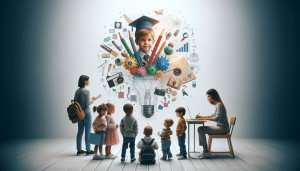You Can Unlock Digital Skills Without Formal Degrees
Oliver Cooper September 16, 2025
Explore accessible pathways for gaining digital skills that matter in today’s world. This article guides through self-paced online learning, micro-credentials, and digital literacy tools, showing how these resources empower individuals beyond traditional degree programs.
Why Digital Skills Matter for Every Generation
Digital skills now influence every sector, from business and education to healthcare and public services. These abilities go far beyond basic computer usage and involve understanding data, communication, and security tools. People of any age can see their lives transformed by mastering these skills. Being digitally literate isn’t just for technology professionals; it benefits everyone who works, learns, connects, or accesses services online. A growing number of employers now prefer candidates with proven digital literacy, regardless of formal qualifications or age (Source: https://digitalpromise.org/initiative/adult-learning/digital-literacy/).
The breadth of digital skills ranges from simple internet navigation to coding, analytics, and collaborative platforms. As the world shifts towards remote and hybrid working, virtual meetings, and digital collaboration spaces, being able to manage and interpret information online has become essential. Besides career advancement, these abilities help individuals participate fully in society, access vital information, and stay connected to local or global communities.
Intergenerational learning can bridge technology divides and empower entire families to engage with digital opportunities. Parents, children, and grandparents can all benefit from learning together. Programs promoting cross-generational digital literacy help close the digital divide, making it easier for all to navigate digital government forms, health services, and online education. As digital landscapes evolve, the importance of keeping skills updated becomes even more pronounced, reinforcing the need for lifelong learning habits.
Online Learning and Micro-Credentials: New Pathways
The rise of self-paced online learning and micro-credentials has changed how people approach education. No longer is a formal degree the only ticket to skill development or workplace advancement. Trusted providers, such as Grow with Google and edX, offer courses in data analytics, web development, and digital communication that are accessible to anyone, often at no cost (Source: https://grow.google/). These targeted courses focus on practical, industry-relevant skills and frequently end with micro-certifications. These credentials provide tangible proof of mastery, helping learners showcase new abilities to current or prospective employers.
Micro-credentials differ from full degrees in that they focus on a narrow skill set and are earned quickly. Many organizations now recognize the value of badges, certificates, and short-format online programs. The flexibility of remote study fits around work and family obligations, making career upskilling more attainable irrespective of one’s location or schedule. Research highlights that these courses are especially beneficial for adult learners looking to shift careers or add new technical capabilities to their existing roles (Source: https://www.americanprogress.org/article/micro-credentials-more-than-a-buzzword/).
Some learners still wonder whether micro-credentials truly matter in the hiring process. Recent industry surveys confirm many companies now scan for digital badges or course certificates related to project management, data literacy, or IT support. Earning these micro-credentials can demonstrate initiative and verify up-to-date knowledge, even in sectors that formerly demanded full university degrees. This evolution is making skill development more affordable and inclusive, with results that align with real-world job requirements.
Exploring Digital Literacy Tools and Resources
For those seeking to boost digital literacy, a wealth of online tools exist to build basic and advanced skills. Libraries and community organizations frequently partner with digital inclusion initiatives to offer accessible courses in topics like password security, online privacy, and productivity software. Resources such as GCFGlobal and DigitalLearn provide free tutorials and interactive activities for all ages (Source: https://edu.gcfglobal.org/en/subjects/tech/). These tools help learners navigate the essentials—search engines, spreadsheets, word processing—and venture into more complex computing.
Digital literacy is not just about hardware and software; it also includes evaluating information credibility and understanding online etiquette. With the surge in social media and user-generated content, distinguishing between trustworthy and misleading sources has become a vital skill. Digital citizenship education emphasizes respectful, safe behavior on the internet and an awareness of privacy and cyberbullying concerns. Many new programs segment content by age or ability level, ensuring tailored learning for different groups.
Public libraries play a unique role in expanding digital access. Many provide computers, Wi-Fi, and hands-on workshops for those without home internet or personal devices. There are also grant-supported projects that provide low-cost connectivity and digital devices to underserved neighborhoods (Source: https://www.imls.gov/issues/national-initiatives/digital-literacy). By harnessing these community resources, learners can bridge gaps and participate in civic life, education, and the employment sector more confidently.
The Power of Self-Paced and Peer Learning
Individuals often thrive in self-paced environments, especially when exploring new technologies. Platforms like Coursera, OpenLearn, and Khan Academy offer structured modules that adapt to a learner’s pace (Source: https://www.open.edu/openlearn/). Flexible learning allows users to repeat lessons, skip ahead, or pause around real-world commitments. Self-motivation becomes the engine for continual skill-building as new professional and personal needs arise.
Peer learning is another powerful component of digital skill development. Community-led groups, coding bootcamps, or local tech meetups create spaces for collaborative education, allowing learners to build confidence and ask questions in a supportive environment. These informal networks foster networking opportunities and mentorship, boosting both soft and technical skills. Studies have found that individuals engaged in collaborative digital projects tend to sustain their learning momentum and adapt more quickly to technological change.
Combining independent study with group sessions expands a learner’s toolkit and accelerates success. Virtual study groups or online forums provide support, feedback, and accountability. By working with others online, individuals improve not just their own knowledge but also help peers master difficult concepts. Digital collaboration skills, such as using shared documents or managing remote teams, are increasingly recognized and rewarded in the workplace.
Addressing Digital Inequality
Despite the rapid expansion of digital learning platforms, access remains uneven due to affordability, connectivity, and device availability. Many low-income families and rural communities face persistent disparities in broadband coverage and computer access. Educational policy efforts in multiple regions are now targeting these gaps, supporting programs that distribute devices and subsidize internet costs. National and regional governments, in partnership with nonprofits, are working to remove barriers and create more equitable access to digital resources (Source: https://broadbandusa.ntia.doc.gov/).
Digital inequality not only limits educational options but also impacts economic mobility and civic participation. Marginalized groups can be left behind in job searches, telemedicine, government services, and online education if these barriers persist. Addressing digital equity is now recognized as a critical component of social justice and workforce readiness. Policymakers urge for inclusive strategies, such as support hotlines, public internet kiosks, and specialized outreach programs to ensure no one is left offline or behind.
Creating sustainable solutions for digital inequality involves a multi-layered approach: affordable devices, ongoing digital skills training, and accessible customer support for troubleshooting barriers. Partnerships between schools, libraries, tech companies, and social organizations make these solutions more widely available. Promoting lifelong digital learning and making resources easy to find and understand are pivotal in narrowing the digital skills gap and preparing entire communities for the digital future.
Lifelong Learning and the Future of Digital Education
The pace of technological development means digital skills can quickly become outdated. Lifelong learning is no longer optional; it’s a necessity for adapting to changes in the workplace, social life, and civic engagement. Upskilling and reskilling are built into the DNA of modern education systems, with employers now investing in ongoing digital training for their staff (Source: https://ec.europa.eu/social/main.jsp?catId=738&langId=en&pubId=8354).
Future digital education trends emphasize customizable experiences, competency-based assessments, and immediate feedback, bridging learning with real-world application. Artificial intelligence and adaptive learning systems personalize learning journeys, suggesting relevant content or practice opportunities tailored to the learner. These innovations make education more accessible to diverse populations and ensure that digital literacy keeps pace with ever-evolving workplace expectations.
Cultivating digital curiosity and confidence helps individuals tackle emerging challenges, like understanding data security or responsibly using AI tools. Encouraging a growth mindset—a willingness to learn, unlearn, and relearn—prepares individuals for an unpredictable future. This lifelong approach empowers people to leverage digital technologies creatively and ethically, yielding benefits in both personal and professional spheres while fostering a resilient, adaptable society.
References
1. Digital Promise. (n.d.). Digital Literacy. Retrieved from https://digitalpromise.org/initiative/adult-learning/digital-literacy/
2. Grow with Google. (n.d.). Digital Skills Training. Retrieved from https://grow.google/
3. Center for American Progress. (2022). Micro-credentials: More Than a Buzzword. Retrieved from https://www.americanprogress.org/article/micro-credentials-more-than-a-buzzword/
4. GCFGlobal. (n.d.). Technology Basics. Retrieved from https://edu.gcfglobal.org/en/subjects/tech/
5. Institute of Museum and Library Services. (n.d.). Digital Literacy Initiatives. Retrieved from https://www.imls.gov/issues/national-initiatives/digital-literacy
6. BroadbandUSA. (n.d.). Expanding Broadband Access and Digital Equity. Retrieved from https://broadbandusa.ntia.doc.gov/







